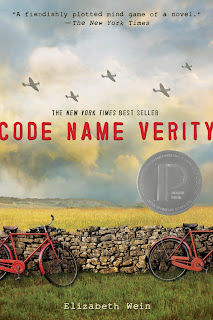Code Name Verity
Code Name Verity is a young adult novel by Elizabeth Wein that has won all sorts of awards, and is an uncompromising look at the role two young women during World War II. But I had trouble engaging with it, and didn't like it as much as I would have liked.
The novel is in two halves. The first half is the written confession of an English (or, as she keeps pointing out, Scottish) spy who has been captured by the Nazis and is kept in a prison in the fictional city of Ormaie. She was caught by looking the wrong way in crossing a street. Her confession is rambling, and the gestapo chides her for making it like a narrative. Indeed, she even goes so far as to writing it in the third person, and we the reader don't know who she is in the story.
That threw me off, as it is well into the story that I realized she is not Maddie Brodatt, who is a young pilot who is recruited by the Air Transport Auxiliary, usually ferrying personnel around the U.K. It is while she is doing this she meets the narrator of the first half of the book, who doesn't reveal her name until the end of that half, so I won't reveal it here.
Our narrator is seen by the other prisoners as collaborating, but we realize that she is an unreliable narrator, and the information she is giving may not be accurate. But her imprisonment is nonetheless harrowing, and at the end of the half we are told she will be sent off to a place to be used for medical experiments.
The second half details Maddie's adventure flying into France to meet with resistance fighters. They are going to try to rescue the spies capture in Ormaie and blow up the gestapo headquarters. This is a more conventional and easy to follow spy story, and the scene in which the narrator and Maddie see each other again is very well done.
The book is okay, but I wasn't gripped by it as others have been. It is informational on how women contributed to the war effort, and Maddie is a great character (she is the one who is able to fix a stalling automobile, not the men around her). I just felt at a distance from the characters, and it's perhaps because I never got fully in stride after the subterfuge of the first chapters. I also wonder why she fictionalized many things, including the city of Ormaie, which had me wondering about where it was supposed to be.
The prose is very good, though, with this passage close to the end very beautiful: "But a part of me lies buried in lace and roses on a riverbank in France--a part of me is broken off forever. A part of me will always be unflyable, stuck in the climb."
The novel is in two halves. The first half is the written confession of an English (or, as she keeps pointing out, Scottish) spy who has been captured by the Nazis and is kept in a prison in the fictional city of Ormaie. She was caught by looking the wrong way in crossing a street. Her confession is rambling, and the gestapo chides her for making it like a narrative. Indeed, she even goes so far as to writing it in the third person, and we the reader don't know who she is in the story.
That threw me off, as it is well into the story that I realized she is not Maddie Brodatt, who is a young pilot who is recruited by the Air Transport Auxiliary, usually ferrying personnel around the U.K. It is while she is doing this she meets the narrator of the first half of the book, who doesn't reveal her name until the end of that half, so I won't reveal it here.
Our narrator is seen by the other prisoners as collaborating, but we realize that she is an unreliable narrator, and the information she is giving may not be accurate. But her imprisonment is nonetheless harrowing, and at the end of the half we are told she will be sent off to a place to be used for medical experiments.
The second half details Maddie's adventure flying into France to meet with resistance fighters. They are going to try to rescue the spies capture in Ormaie and blow up the gestapo headquarters. This is a more conventional and easy to follow spy story, and the scene in which the narrator and Maddie see each other again is very well done.
The book is okay, but I wasn't gripped by it as others have been. It is informational on how women contributed to the war effort, and Maddie is a great character (she is the one who is able to fix a stalling automobile, not the men around her). I just felt at a distance from the characters, and it's perhaps because I never got fully in stride after the subterfuge of the first chapters. I also wonder why she fictionalized many things, including the city of Ormaie, which had me wondering about where it was supposed to be.
The prose is very good, though, with this passage close to the end very beautiful: "But a part of me lies buried in lace and roses on a riverbank in France--a part of me is broken off forever. A part of me will always be unflyable, stuck in the climb."



Comments
Post a Comment